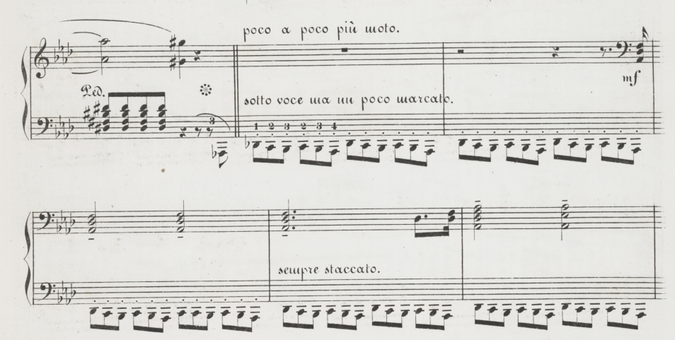
A change of pace from the Messiaen...
I have sat on this recording for almost a year and a half now. In general, I was not happy with this recording session and only had a couple movements of Mozart cleaned up to actually share publicly. But I’ve continued to think about this Franz Liszt run. It is messy in the beginning with a couple memory lapses but generally stays on track and presents how I’ve heard this piece in my head. But there is another reason I’ve always been hesitant to widely share my performances of this piece. I drastically depart from the standard performance practice in one notable area. Funérailles is famous for the middle section fanfare, the military parade which, as the route passes by the listener, the pianist explodes the thunderous bass ostinato with octaves. It’s virtuosic and may or may not reference Chopin’s famous A-flat Polonaise. Here’s the beginning of the section, from the first edition: Notice the tempo marking: poco a poco piú moto, or, ‘little by little more motion’ from the last tempo indication, which was adagio, in the very beginning. Other editions, including Henle’s Urtext, and editions by Emil von Sauer and Liszt student Jose Vianna da Motta agree. And YET no one plays it like this. At the beginning of this section, the second measure in the excerpt above, performers always take a new, fast, tempo. I’ve never understood this. Franz Liszt clearly marks a new tempo (Allegro energico assai) only at the climax of this section, and continues to reinforce the poco a poco piú moto until that point is reached. But performers always begin this section very fast. Are they afraid that they will not be fast enough by the time octaves are introduced and be accused of lackluster octave technique? Practice pacing yourself. You can start slowly but get to a tempo to leave no doubt in your abilities. You run the risk of the opposite problem: starting fast, and trying to get faster so that your octaves are doomed to fail. Even Horowitz succumbed to this extravagant failure and had to drastically cut the tempo back at the climax of the section. My performance of the military march here is an accurate depiction of this section, I think, and the effect of movement, the tension of the unyielding ostinato, and the pride of the moment is accentuated if this section begins adagio. It makes for a strong musical choice, but I have yet to find anyone to actually make this observation, whether in writing or in performance. Particularly listen to 7:00-9:15. The military march section begins at 7:25, the octaves at 8:30, and the Allegro energico assai at 8:50. What do you think? Give it a couple listens then tell me if you're convinced, or if you find the sudden tempo change a better choice. I'd love to hear from you! |
"Modern performers seem to regard their performances as texts rather than acts, and to prepare for them with the same goal as present-day textual editors: to clear away accretions. Not that this is not a laudable and necessary step; but what is an ultimate step for an editor should be only a first step for a performer, as the very temporal relationship between the functions of editing and performing already suggests." -Richard Taruskin, Text and Act Archives
March 2021
Categories
All
|
 RSS Feed
RSS Feed
